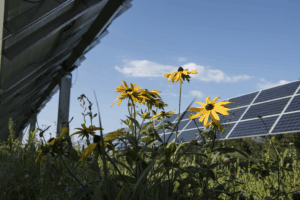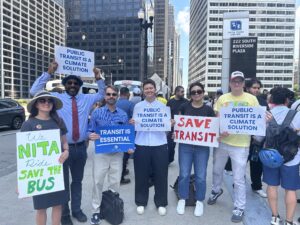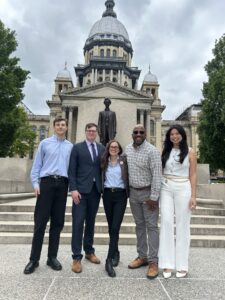Illinois Clean Jobs Coalition rally in Springfield
November 06, 2025
Two Climate Wins for Illinois: Public Transit & Clean Energy
The Illinois General Assembly passed a transformative transit bill, mere hours after passing clean energy legislation, an incredible one-two punch for climate action
By Lena Guerrero Reynolds, Communications & Policy Advocate & Karsten Neumeister, Media Relations Specialist
This October, the Illinois General Assembly passed major legislation saving public transit in Chicagoland and protecting Illinois ratepayers from runaway energy costs. These two bills — the transit bill and the energy bill — put the state on a strong and sustainable path forward. ELPC worked with lawmakers and our partners in the Illinois Clean Jobs Coalition to turn our ambitious plans into legislative reality.
Transportation and energy are the leading sources of carbon emissions in Illinois, but they are also integral to everyday lives across the state. Passing these bills helps make sure we have affordable, accessible, and sustainable options to get around and power our lives. Thank you to the hundreds of constituents who sent emails to their lawmakers, joined us in Springfield this year, and provided financial support to make this win possible.
Transit Bill: Northern Illinois Transit Authority Act
Public transit has been underfunded for years, but when the pandemic came along and travel patterns changed dramatically our transit agencies faced a “fiscal cliff.” Our coalition saw an opportunity to rebuild better. By passing the Northern Illinois Transit Authority (NITA) Act, lawmakers not only saved the system, but reinvested in its future. For the first time, the transit system has both the operating resources and oversight needed to provide seamless, safe, and reliable transit across the Chicagoland region and across the state.
Key provisions of the NITA Act include:
- Averting the fiscal cliff – CTA, Metra, and Pace were on the precipice of 40% service cuts across the region by 2027, which would have been devastating for traffic and the economy. The $1.5 billion in new operations funding in the NITA bill ensures we don’t just fill the gap but instead go above and beyond to transform transit for the next generation. The best way to grow ridership is to make transit fast, frequent, safe, and accessible. The additional revenue will do just that.
- Regional, rider-centered service – For decades, Chicago’s transit agencies have been incentivized to compete with one another for riders and fares. The new Northern Illinois Transit Authority flips the script and brings the region together to put the rider first. For the first time, we will have one fare, one timetable, and one app, making it easier to travel throughout the six-county area.
- Safety & accountability – Throughout this process, safety was a consistent concern raised among workers, riders, and political leaders, and this bill goes a long way towards both immediate and long-term comprehensive solutions. An interdepartmental task force made of county, state, and city police will increase eyes on the system for three years. Transit ambassadors will monitor for passenger activity and call in social services, law enforcement, or other community resources as needed. Advisory committees will provide long-term recommendations and coordination between agencies.
- Downstate benefits – Chicago’s not the only place in Illinois with public transit. Metro-east is expanding its light rail system, the Quad cities bus network has gone all-electric, and Champaign has some of the highest ridership rates in the nation! The NITA bill provides funding for the 50+ transit agencies statewide, including 16 major metropolitan areas and 34 rural/county operations, plus funding for passenger rail and state-level coordination between transit agencies and intercity rail and bus networks. The bill fosters transit-to-trails infrastructure and transit-oriented development to rebuild historic downtowns and support a more walkable, bikeable Illinois.
Energy Bill: Clean & Reliable Grid Act
 Illinois leaders took action to protect consumers and strengthen the state’s power grid with the passage of the Clean and Reliable Grid Affordability (CRGA) Act (SB25). The new law makes cost-effective investments in clean energy, battery storage, and energy efficiency.
Illinois leaders took action to protect consumers and strengthen the state’s power grid with the passage of the Clean and Reliable Grid Affordability (CRGA) Act (SB25). The new law makes cost-effective investments in clean energy, battery storage, and energy efficiency.
Key provisions of the CRGA Act that are good for both ratepayers and the environment include:
- Developing 3 gigawatts of new battery storage capacity, by creating a competitive procurement program which will allow Illinois to store energy and use it when needed most — improving grid resilience and reducing costs for consumers.
- Accelerating connection of renewables to the grid, through policy adjustments that facilitate additional clean capacity procurement and address resource adequacy challenges.
- Reducing peak energy demand, with programs such as virtual power plants and time-of-use rates that shift electricity use away from high-cost periods, reducing overall system costs.
- Expanding utility-run energy efficiency and consumer rebate programs, helping participating gas and electric customers lower their bills, while delivering system-wide savings for all customers and reducing reliance on expensive gas.
The NITA and CRGA Acts are a big deal for Illinois. Even as the federal government is stepping back, we’re stepping up in the Midwest to mitigate the two biggest sources of climate change. More importantly, as cost of living is on the rise, these bills help protect affordable energy and transportation options for everyday Illinoisans. ELPC joined partners from across the state to advance this legislation in Springfield, and we look forward to supporting the agencies and leaders as we move towards effective implementation.




